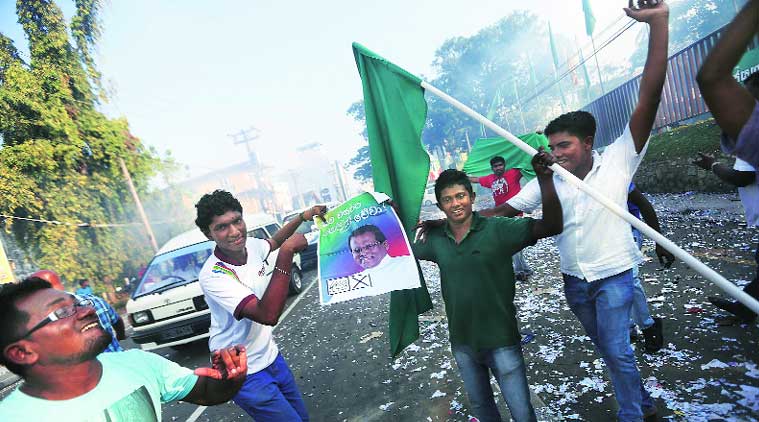Stay updated with the latest - Click here to follow us on Instagram
Rising tide of anger sinks Rajapaksa’s chances
Rajapaksa’s family-centric rule was another major reason for people to turn their backs to him.
 Maithripala Sirisena’s supporters celebrate after results were declared in Colombo, Friday. (Source: Reuters photo)
Maithripala Sirisena’s supporters celebrate after results were declared in Colombo, Friday. (Source: Reuters photo)
After the election verdict became clear in Sri Lanka early Friday morning, Mahinda Rajapaksa quickly shifted from his presidential residence, Temple Tree, to a house offered by one of his friends, a businessman, in Colombo. For many observers, this hasty exit showed that Rajapaksa knew the extent of anger that his government had generated among people.
So what does Rajapaksa’s exit from the seat of power mean? Paikiasothy Saravanamuttu, from the Centre for Policy Alternatives, a Colombo-based thinktank, said Rajapaksa’s defeat meant that people had finally got an opportunity to return to a democratic process and hope for better governance.
“Now we have a 100-day plan to from a democratic government Sirisena promised during the election. That is the main advantage,” he said.
Saravanamuttu added that the new government will have more room for minorities and parties such as Tamil National Alliance (TNA) to push for a political settlement.
Asked to sum up people’s expectations, this is what Saravanamuttu said: no more attacks on minorities, no impeachment of a Supreme Court Chief Justice, no corruption in the government.
According to other analysts, the Tamil population in the northern and southern-central provinces were not convinced by Rajapaksa’s claims that he would build roads and railways for them. His war-triumphalism among the Sinhalese did not work. And, Muslims complained of insecurity and fear.
A close aide of the new President Maithripala Sirisena recalled how disturbed he was when the former Chief Justice of the Supreme Court Shirani Bandaranayake was ousted through impeachment and replaced with Mohan Peiris, one of Rajapaksa’s legal advisors. “It was a witchhunt against her. Like Sirisena, many other ministers who were upset with the decision had no room to voice their dissent. It was a dictator’s rule,” the aide said.
Rajapaksa’s family-centric rule was another major reason for people to turn their backs to him. The President himself held at least five key portfolios while his brother Gotabhaya was the defence secretary besides looking after the urban development ministry.
Another brother Basil was considered a key man although he kept a low profile. An MP who defected from the Rajapaksa government before the elections said Basil “controlled many crucial matters in the government on which there were cold wars within the family too”.
Basil was in charge of economic policies, held the additional post of senior advisor to the president, and was given the task of developing infrastructure in the northern and eastern provinces. Another brother Chamal Jayantha was the speaker of the parliament while Rajapaksa’s son Namal, who is currently an MP, reportedly had plans to contest the Presidential elections in the future.
Behind all of them was the man who reportedly extended moral support to Rajapaksa —- Sumanadasa Abeygunawardena, an astrologer from Galle. It was Abeygunawardena who reportedly asked Rajapaksa to seek an unprecedented third term by calling the elections two years earlier than scheduled. The astrologer reportedly told the President that January 8 was the most auspicious day.



- 01
- 02
- 03
- 04
- 05




























